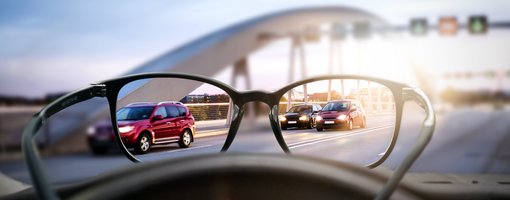Driving licence for short-sightedness and farsightedness:
You didn't pass the eye test? That's no big deal, because glasses or contact lenses can easily compensate for your poor vision, so you can start with your driver's license. Through the eye test with the optician or the ophthalmologist, it can also be determined what kind of visual impairment you have and how severe this visual impairment is. This article will show you what you should keep in mind when dealing with short-sightedness and farsightedness.

An average good eyesight is called visual acuity 1.0. For most people, however, there are deviations. A basic distinction is made between short-sightedness and farsightedness. So even before the first driving lesson, you should check whether you suffer from one of the visual impairments mentioned above. Because in Germany the rule is: Only those who have the right visual performance are allowed to take the wheel!
Of course, it can also happen that nearsightedness or farsightedness only occurs after you have obtained your driver's license. In this case, however, it is not obligatory to have the visual impairment entered in the driver's license. However, we strongly recommend that you wear a visual aid anyway. In the event of a potential accident, you could otherwise be guilty of negligence if the accident could have been avoided with an existing visual aid.
Short-sightedness
You notice you're seeing things more and more blurred from a distance? Then you may suffer from short-sightedness and should urgently make a sight test before the first driving lesson. You can breathe a sigh of relief, though! Short-sightedness in your driver's license is basically not a problem, because in most cases your visual impairment can be compensated by wearing glasses or contact lenses.
Important to you:
- If you need a visual aid, this will be noted on your driving licence and checked during traffic checks (code number 01 under point 12)!
- For nearsightedness from -0.25 dioptres or more, a visual aid is mandatory!
Far-sightedness
Farsightedness in the driving licence
Far-sightedness is a visual impairment in which it is difficult to recognize things at close range. However, the regulations for a visual aid for this type of visual impairment are by far not as strict as for short-sightedness. So if you have only weak farsightedness, you can even drive without glasses or contact lenses.
Important for you:
- Only with a farsightedness of +2.00 dioptres or more will the visual aid be entered in the driver's license (code number 01 under item 12). Wearing it then becomes a duty!